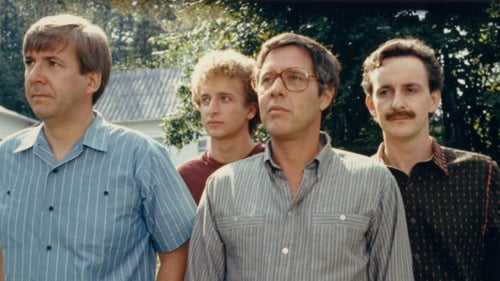
Self
Monique Fortier was one of the few women to make her way in the male world of the NFB in the 1950s. But make her way she did. Beginning as a secretary, she graduated to editing and in 1963 she became the first francophone woman to direct her own film, À l'heure de la décolonisation. Her NFB colleague Anne Claire Poirier would make her first film the same year. Fortier subsequently returned to editing, quietly labouring at the Steenbeck, shaping films that helped define Direct Cinema.

Editor
The Director reflects upon and seeks to understand the causes and the events that lead to her drug-addicted prostitute daughter being murdered at the age of 26.

Editor
Two well-known Quebec artists (filmmaker Jacques Godbout and playwright René-Daniel Dubois) look at the Battle of the Plains of Abraham. Whose version of this historic event should prevail? Is history best served by documentary or fiction? We also meet Baron Georges Savarin de Marestan and Andrew Wolfe-Burroughs, direct descendants of Montcalm and Wolfe, both of whom died in the battle that would give birth to Canada and to the province of Quebec.

Editor

Editor

Editor

Editor
In a poor eastern quarter of Montreal, a restaurant is dedicated for the poors only: le Chic Resto Pop. It used the surplus of some merchants to offer cheap meals. The young people who work there for free get a lot of satisfaction in their work in spite of the difficulties. The movie is build around six songs written by them.

Editor
This feature documentary uses music to reveal the many faces of jazz, New Orleans style. Colourful and alive with music, the film captures the street life and traditions of this vibrant city and explores the roots of the music that springs from the soul of the African-American community.

Editor
Four very different Montreal university teachers gather at a rambling country house to prepare a dinner. Remy (married), Claude (a homosexual), Pierre (involved with a girlfriend) and Alain (a bachelor) discuss sex, the female body and their affairs with them. Meanwhile, their four female guests, Louise (Remy's wife of 15 years), Dominique (a spinster), Diane (a divorcée) and Danielle (Pierre's girlfriend) are spending the time at a downtown health gym. They also discuss sex, the female body and, naturally, men. Later in the evening, they finally meet at the country house and have dinner. A ninth guest, named Mario, who used to know Diane, drops in on the group for some talk and has a surprise of his own.

Editor

Editor
Man of the people, taxi driver, Jean Carignan is above all else one of the world's greatest violinists. In his hands reels become complex, intelligent creations, played with a virtuosity worthy of Paganni, and which continue the traditions of a genre passed on orally. A genre which has retained its popularity, and whose giants include Skinner, Coleman, Allard. Jean Carignan tackles their repertoire, as well as reaping the harvest of his exploration of Irish and Scottish musical traditions, which has made of him an internationally renowned specialist in Celtic music. This film is also a love story between an impoverished child and his violin, and provide a unique window into a remarkable era.

The history of the roles of women in Quebec society, beginning with the women shipped from France to the New World by the King to populate the colony with the men already there, and ending with the modern career woman.

Editor
"This documentary depicts a canoe being built in the traditional manner. Cesar Newashish, a 67-year-old Attikamek of the Manawan Reserve North of Montréal, uses only birchbark, cedar splints, spruce roots, and gum. With a sure hand he works methodically to fashion a craft unsurpassed in function or beauty of design. Building a canoe solely from the materials that the forest provides may become a lost art, even among the Native Peoples whose traditional craft it is. The film is free of spoken commentary but text appears on the screen in Cree, French, and English." - Anthology Film Archives

Editor
In the late 1960s, with the triumph of bilingualism and biculturalism, New Brunswick's Université de Moncton became the setting for the awakening of Acadian nationalism after centuries of defeatism and resignation. Although 40% of the province's population spoke French, they had been unable to make their voices heard. The movement started with students-sit-ins, demonstrations against Parliament, run-ins with the police - and soon spread to a majority of Acadians. The film captures the behind-the-scenes action and the students' determination to bring about change. An invaluable document of the rebirth of a people.

Writer
"I've often wondered what makes beauty" - So says Monique Miller who personifies in this short documentary universal woman, anxious to please since childhood, vulnerable, according to the hours, to the eyes of others, to torture from the wait, to the obsession of the wrinkles of tomorrow.

Director
"I've often wondered what makes beauty" - So says Monique Miller who personifies in this short documentary universal woman, anxious to please since childhood, vulnerable, according to the hours, to the eyes of others, to torture from the wait, to the obsession of the wrinkles of tomorrow.

Editor
This short film is a series of vignettes of life in Saint-Henri, a Montreal working-class district, on the first day of school. From dawn to midnight, we take in the neighbourhood’s pulse: a mother fussing over children, a father's enforced idleness, teenage boys clowning, young lovers dallying - the unposed quality of daily life.












